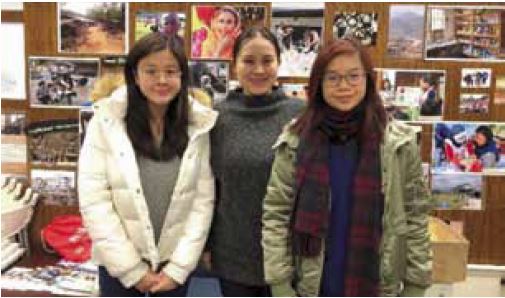© Hong Kong Academy of Medicine. CC BY-NC-ND 4.0
DOCTOR FOR SOCIETY
Breaking down frontiers through medical
humanitarianism: an interview with Prof Emily Chan
Caitlin HN Yeung1; Natalie KW Cheuk2
1 Year 2 MBBS, The University of Hong
Kong
2 Year 3 MBBS, The University of Hong
Kong
In this issue of Doctor for Society, we
interviewed Prof Emily Chan, a doctor with international public health
experience whose career has been fuelled by a passionate humanitarian
spirit that has allowed her to utilise hands-on skills, knowledge, and
opportunities—all culminating in numerous accolades and numerous lives
transformed.
Prof Emily Ying-yang Chan is the current and
founding director of the Collaborating Centre for Oxford University and
CUHK for Disaster and Medical Humanitarian Response (CCOUC) under the
Jockey Club School of Public Health and Primary Care at The Chinese
University of Hong Kong (CUHK). She was the former president of Médecins
Sans Frontières–Hong Kong (MSF-HK), assuming the position in 2001 after 3
initial years of service at MSF-HK. After graduating with an MBBS from The
University of Hong Kong (HKU) in 2003, she worked as a public health
doctor at the Hong Kong Department of Health, and soon after joined the
CUHK Faculty of Medicine with a focus on global health.
Journey into humanitarian medicine and beyond
In retrospect, Prof Chan’s career path has been
straightforward, as her passion for humanitarian work is the apparent link
that unifies most of her projects. In reality, it would be more accurate
to characterise her professional career as a self-discovery process,
combined with a dedication to medicine and to having an impact on the
lives of other people, especially those who are disadvantaged.
Prof Chan was born and educated in Hong Kong; she
went to the United States to continue her high-school education. She
actually took her first step towards medicine when she graduated with a
BSc in Biomedical Engineering at Johns Hopkins University. She jokingly
explained that her undergraduate degree, intended as preparation for entry
into an MD programme, was the obvious choice for an Asian living in the
United States with scientific interests. She fared well in her course,
which had a strong focus on laboratory research. But she knew it was not
her calling. “My mentor advised me that my personality is a better fit for
working with people, outside the laboratory,” said Prof Chan—so off she
went: during the summer break of her junior year, she spent 2 to 3 months
in Zimbabwe with a multidisciplinary team of nutrition and public health
experts. It was a key experience.
“I was enchanted by humanitarian work,” said Prof
Chan, reflecting on her Zimbabwe trip. It kindled a lifelong passion for
public health. After finishing her undergraduate degree at Johns Hopkins
University, she attended Harvard University to study for a Master of
Science in Population and International Health. Shortly after she returned
to HKU to start an MBBS for family reasons, she also began working with
MSF-HK.
Many people were curious about Prof Chan’s long
career with MSF-HK, especially about her participation before qualifying
as a medical doctor. “I was able to join MSF-HK early on, even without a
medical degree, because of my public health skills,” explained Prof Chan.
The combination of skills and needs enabled her to continue to pursue her
interest in humanitarian medicine. She joined MSF-HK in 1998, initially as
part of its flood-relief missions in Guangxi Province, and subsequently
was pivotal in helping MSF put down deeper roots in Hong Kong.
A global career makes a childhood dream come true
Prof Chan enjoys both teaching and learning, and
has an inquisitive and explorative mind. On the recommendation of a
mentor, she began her academic career as a scholar in global health at
CUHK in 2006. She continued juggling her humanitarian work with her work
at CUHK, which focused on global health in times of climate change. At the
beginning of her academic career, she collaborated with a team based in
Oxford University to investigate the area of public health in the
Asia-Pacific region.
“My childhood dream was to be an explorer,” quipped
Prof Chan. Although it was not planned that way, her global career proved
to be a good fit for someone who loves to travel. Her multidisciplinary
expeience influenced her approach to her humanitarian work, and the
advances she led in humanitarian medicine locally and globally also saw
her breaking down frontiers with MSF. Subsequently, she was able to fulfil
her childhood dream by winning the National Geographic Chinese Explorer
Award in 2016, for her role in bridging and breaking frontiers among
academia, frontlines, and professional practice in the fields of science,
medicine, humanities, and education.
A rewarding career on many levels
Prof Chan was also an awardee of the Ten
Outstanding Young Persons of the Year of the World and Hong Kong
Outstanding Young Persons and Leader of the Year in 2015. Her long career
in academic and field medicine for global health and disaster and
humanitarian response established her as a leading advocate and scholar in
the area, with a formidable wealth of experiences and accomplishments.
However, the most memorable moments in her career were the many times when
she was deeply humbled by her team members, especially when realising her
limits in the face of new challenges.
“I wanted but never expected my humanitarian work
to flourish,” Prof Chan said. When she first returned to Hong Kong,
Disaster and Medical Humanitarian Response was a relatively undeveloped
field of medicine in Hong Kong. Over the years, her hard work and
contributions to the field has allowed her to rally many meaningful team
members and inspire the next generation of doctors to participate in
humanitarian aid and disaster relief. She has also been actively
transferring her knowledge to institutional and government partners to
broaden their participation in disaster and humanitarian work and to
provide opportunities to the Hong Kong Academy of Medicine’s specialists
to train in the field. Since 2 years ago, she has even been able to reach
beyond China to establish field training in the Democratic People’s
Republic of Korea, Myanmar, and Nepal.
Making an impact through humanitarian medicine in rural
China
Making a lasting impact on humanitarian trips to
remote locations is a difficult feat, yet Prof Chan has been able to
achieve this. This year marks the CCOUC’s 160th humanitarian field trip
that Prof Chan’s team has returned to Ma’anqiao Village of Sichuan
Province, their first site in rural China. When the team first visited the
village, they faced many difficulties—once the car suddenly broke down and
the team had to carry their belongings and walk for 11 km. Despite
returning to the field sites every year, new challenges arise each time,
which have sharpened Prof Chan’s problem-solving skills. Over the years,
she has adapted field sites into teaching classrooms for students who want
to train in disaster and humanitarian response, so much so that the
villagers have even supported the students in training. Prof Chan’s
commitment and determination to build long-term relationships with service
sites have truly allowed her to realise her dream of making a lasting
impact in underprivileged areas.
In her capacity as the director of the CCOUC, she
has been able to extend her impact in humanitarian work by sharing the joy
and rewards of field work. It has also given her the opportunity to take
on new challenges in the field as a teacher. Once, she led a group of
students to a field site in rural China. Despite warnings about the local
food, a few students got food poisoning and were taken to a nearby
hospital. In this moment of crisis, as the team leader and teacher, Prof
Chan deployed team members to various positions and closely followed up
the laboratory tests and treatment of her students. It was a new
challenge, even with her years of experience as a disaster-response doctor
in the field.
Likewise, it has been a challenging experience for
her students. A PhD student, “usually quite proud of himself,” commented
Prof Chan, was asked to keep an eye on the bags of the sick students.
After 3 hours, she was shocked to find the student in tears. He confessed
that he was unable to do anything for the other students and felt useless
in the field. It proved to be a transformative experience for the student.
“It shows how going into the field is always a deeply humbling
experience,” added Prof Chan.
The field, which Prof Chan sees as her own
“teacher”, is an environment impossible to simulate. That is one of the
reasons behind her regular teaching-cum-service trips with CUHK students
with the CCOUC. Her role as a teacher has given her new perspectives
regarding the field, as she has realised that relief work, however
challenging, is not the only type of frontier that one can encounter. Prof
Chan has not only been crossing geographical borders throughout her
career, but she has also been breaking down walls between different
professions. Personally, she is a wearer of many hats, combining her
skills as a medical doctor, scholar, teacher, and humanitarian worker.
Furthermore, through her humanitarian fieldwork, Prof Chan has gained a
profound appreciation for multidisciplinary collaboration among both
medical and non-medical members of her team.
Humility as a doctor through service in unlikely
corners of the world
Many people may believe that they need to travel to
warzones or disaster areas to provide humanitarian aid. Yet, the worst
humanitarian crises may not be very far from people’s affluent
metropolitan lives, where the haves and have-nots live side-by-side. Back
in the days when the cocktail therapy for HIV/AIDS was still not available
and palliative care was the only intervention offered to AIDS patients,
Prof Chan embarked on one of her first service trips to Bangkok to observe
an outreach team for AIDS patients. The team brought her to the slum area
at the outskirts of the bustling city centre, where cramped huts were
built on stilts above the sewage-filled canals. As she stood at the banks
of the slums, the field nurse gave her a plastic bag. She initially
thought that it was to protect her shoes, but instead the nurse asked her
to tie it around her head as the team began to wade into the murky water
beneath the stilt houses. The stench was nauseating and rats scurried
around her in the turbid waters. Then, in the darkness beneath the huts,
she caught a glimpse of a human shadow. Curled up on a stack of sodden
cardboard was a half-naked, rail-thin man with cockroaches and fleas
swarming around him—this was the patient they were meant to visit.
The patient had been abandoned by his family after
contracting HIV by having unprotected sex with HIV-positive men, and he
was unable to seek help at care facilities owing to the high medical
costs. The field nurse brought him food, listened to what he had to say
and cleaned his ulcers and wounds on his body, while singing with her
soothing voice like an angel.
“Doctors play a very important role in humanitarian
medical missions, yet the best doctoring and humanitarian spirit is not
always best exemplified by doctors,” said Prof Chan. It was the nurse who
truly exemplified what it means to support human dignity with a
humanitarian spirit, and that was when Prof Chan learnt how to cherish the
contributions by other professionals.
Doctors for humanitarian medicine
Prof Chan believes that “humanitarian work
experience is useful not only for young, aspiring students but also
experienced doctors.” Being a good doctor in the field has important
differences from everyday clinical work. Doctors with experience can share
their life stories in the field with trainees so as to transfer knowledge
to them, but experienced doctors also benefit from field work, as the
landscape is fast evolving. Humanitarian work may not be enjoyable for
everyone, but the cost of participating in a humanitarian response team is
more than outweighed by the development gained in one’s personal life.
Although she has been able to handle the rather
tiring moment-to-moment problem-solving required for fieldwork, travelling
has become exhausting with age. Prof Chan describes the present as a
period of transition, as she gradually moves away from the frontline in
the field towards a greater focus on her academic work. However, this
shift does not mean that she will stop engaging herself with the
humanitarian work that has enchanted her from the start. “Reading and
learning from books alone is not sufficient for teaching in my field,”
remarked Prof Chan. She demands herself to be able to foresee developments
and see through trends related to her teaching and research interests in
order to provide timely preparation for her students’ career after
graduation. As a result, she plans to remain an active participant in
humanitarian work and disaster response to keep tabs on ongoing trends in
these areas.
Acknowledgement
All photographs, except the last one, were kindly
provided by CCOUC and were reproduced with permission. (© CCOUC. All
rights reserved.)
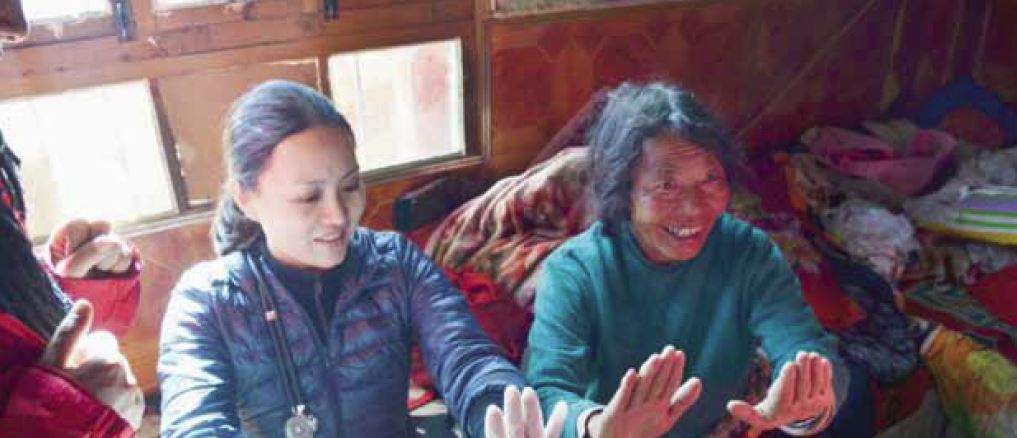
Prof Chan conducted basic health examinations for Tibetan women in Qinghai in November 2013 (© CCOUC)
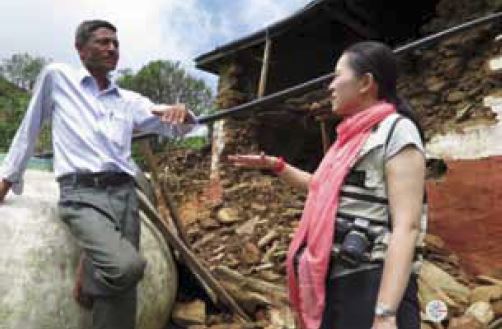
Prof Chan conducted post-earthquake assessment in Nepal, June 2015, where she met Topalo, the village representative and a teacher who endeavours to educate children on the knowledge and awareness of disaster preparedness (© CCOUC)
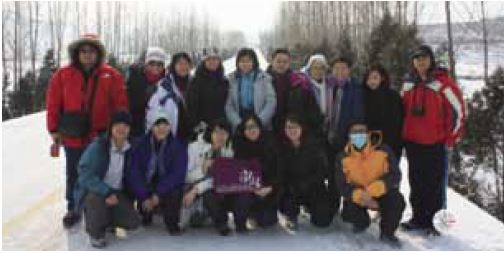
Prof Chan (back row, fifth from right) led a group of students from the Jockey Club School of Public Health and Primary Care, The Chinese University of Hong Kong, to a field site in Datan Village, Zhangjia County, Tianshui City, Gansu Province, China, during a snowstorm in January 2011. The visit aimed to educate and promote public health and disaster preparedness (© CCOUC)
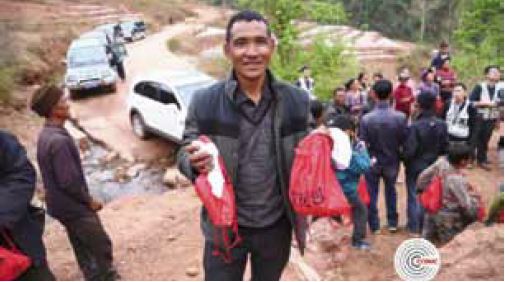
Emergency kits were distributed to villagers when Prof Chan’s team visited Hongyan Village of Sichuan Province in March 2014 (© CCOUC)


